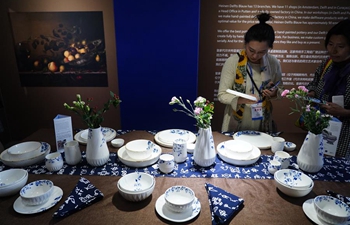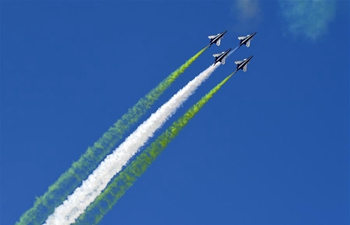SYDNEY, Oct. 18 (Xinhua) -- A new study of over 500 long-haul passengers has revealed that travellers have a lot to learn when it comes to fighting jet lag.
Set to begin the world’s first non-stop commercial flight routes from Sydney, Brisbane and Melbourne to New York and London, Australian airline Qantas has garnered the help of the University of Sydney’s Charles Perkins Centre (CPC) to identify scientifically backed methods to reduce time-zone fatigue on ultra-long haul journeys.
Ahead of the carriers’ 19-hour Project Sunrise research flight, which will examine the wellbeing of around 50 passengers and crew using wearable technology sensors that can measure sleeping patterns, alertness and food consumption, the preliminary research found that most people are using ineffective strategies to deal with jet lag.
According to the data, while 54 percent of people surveyed used earplugs to help them nod off, while 38 percent opted for alcohol and a further 10 percent turned sleeping tablets.
“Drinking more than a few glasses of alcohol will make jet lag worse,” Specialist sleep researcher Dr. Yu Sun Bin, who is part of the CPC team, said on Friday.
“It might make us fall asleep faster but beyond a certain point, it also disrupts the quality of sleep and causes dehydration.”
“We know that going outdoors for sunlight at the destination is one of the most important strategies for syncing the body clock, but only 47 percent of passengers made the effort to do it.”
One of the initiatives Qantas has already implemented on its Perth to London route is a light therapy Transit Lounge to help passengers acclimatize to the new time zone.
With outdoor areas in both the lounge and terminal exposing travellers to natural light, researchers have also developed a Wellbeing Studio which encourages passengers to stretch.
“Project Sunrise is pushing the boundaries, a lot of what we’ll be doing is world-first,” Qantas Group CEO Alan Joyce said.
“We know we need to think harder about crew and passenger wellbeing when you’re airborne for almost 20 hours, and that’s why this research is so important.”
“We’ll be fitting pilots with equipment to monitor their brain patterns when they’re on the flight deck and when they’re resting.”
With the new research ready to test alternatives to how airlines have managed inflight service for decades, Joyce explained that with night flights, passengers are usually provided with dinner shortly after take-off and then the lights are turned off.
“But this may not necessarily be the best way to help reset a passenger’s body clock to the destination time zone, so we are excited to see what medical science can do to help shape how people fly in the future.”

















